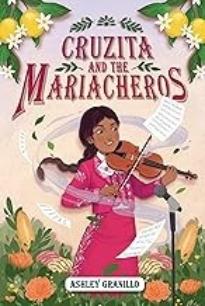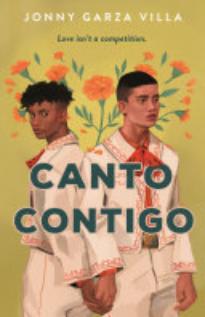Music--Mariachi
3 Reviews
(2)
4-6
Cruzita Tayahua ends sixth grade with a D in Spanish, which is embarrassing considering her family's Mexican roots. But being fluent in Spanish isn't a priority for Cruz, who dreams of being an American pop music superstar. Her summer plan: visit the music theme park Encore Island and enter the Rising Star Contest. A trip to Hollywood isn't part of Cruz's parents' plans, however. They need her help in the family's struggling panadería in the Pacoima neighborhood of Los Angeles, which has been losing customers since her tio Chuy's death a month earlier. When her grandmother gives Cruz a violin "that once belonged to my great-grandpa" and signs her up for mariachi lessons, Cruz is reluctant: "So I'm supposed to learn to speak Spanish and play the violin at the same time?" She's surprised to find that she can sing in Spanish and to discover that she likes being connected to her culture. An unexpected opportunity means she has to choose between her dreams and obligations to family and new friends. Cruz's inner conflict and search for identity are sensitively drawn, and Granillo weaves a believable sense of community pride into the heartfelt and enjoyable story.
Reviewer: Yesica Hurd
| Horn Book Magazine Issue:
May, 2024
(2)
K-3
Illustrated by
Erika Rodriguez Medina.
Adela loves mariachi music and her family's mariachi band. Her relatives all participate, either playing an instrument or dancing -- but not Adela. Her attempts to dance and to play la trompeta and la vihuela are frustrating, and she's too impatient to spend time learning. Vega takes readers through Adela's struggle, as she eventually finds her place in the band. Medina's illustrations teem with movement and color. The vibrant double-page spreads showcasing the various instruments are full of joy. Medina also leans into Adela's frustration and disappointment, and we feel her full emotive range. This book celebrates family, music, and finding one's place in a seemingly full space. An author's note provides information about mariachi history as well as some details about mariachi players in Vega's own family. Concurrently published in Spanish as Los mariachis de Adela.
Reviewer: Yesica Hurd
| Horn Book Magazine Issue:
September, 2024
(2)
YA
Mariachi is everything to seventeen-year-old Mexican American Rafael Casimiro Álvarez, given his natural singing talent and the musical chops that run in his family. After the death of his abuelo, upholding his mariachi legacy becomes a way to cope with the loss. When Rafie's family moves from (fictional) North Amistad to San Antonio at the start of his senior year, he expects to be lead vocalist in his new school's perpetually second-place mariachi group, Todos Colores. His hubris wins him few fans and he is instead made to sing backup for Rey, a cute boy Rafie hooked up with at a party during the previous year's Mariachi Extravaganza Nacional competition. Rafie's ambition forces him to suppress his lingering feelings for Rey, but both find their mutual attraction difficult to ignore. Determined Rey, who is afromexicano and trans, is an antidote to Rafie's attitude, as are the queer and proud members of Todos Colores, a fully realized group who celebrates their Mexican heritage, and counter any mariachi conventions steeped in machismo and homophobia (as addressed in an author's note). The use of Mexican argot adds relatable humor, while Rafie's frustrating road to growth and the mariachi musical backdrop make for a memorable queer romance.
Reviewer: Jessica Agudelo
| Horn Book Magazine Issue:
May, 2024
3 reviews
We are currently offering this content for free. Sign up now to activate your personal profile, where you can save articles for future viewing.






